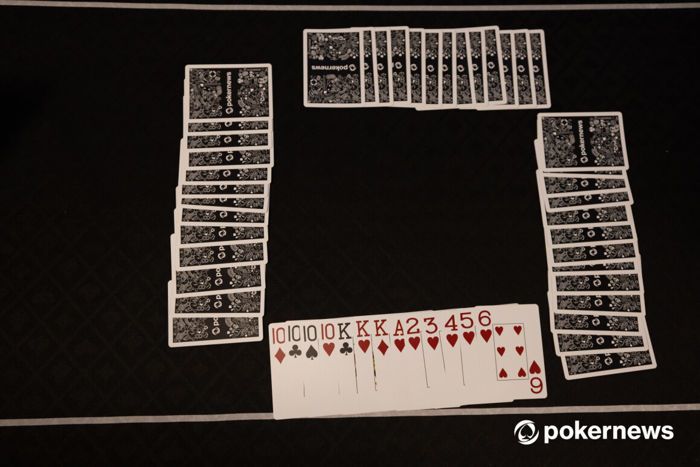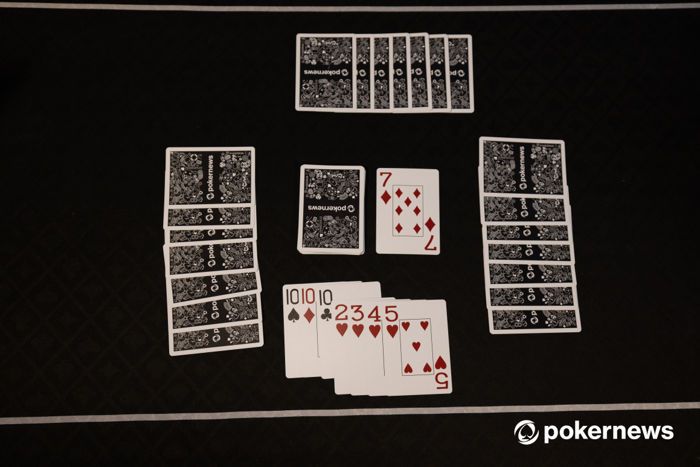How to Keep Score in Rummy - Mastering Rummy Scorekeeping

Mastering the art of keeping score is integral to fair and competitive gameplay in Rummy. This section provides essential information on the significance of accurate scoring, highlighting its role in maintaining a level playing field. Understanding the Rummy scoring system is crucial for players aiming to navigate the game strategically and emerge victoriously.
As the foundation for a successful Rummy experience, this introduction sets the stage for an in-depth exploration of scorekeeping intricacies in subsequent sections. Here's our complete guide on how Rummy scoring works.
Basic Rules of Rummy Scorekeeping
Rummy scorekeeping involves a set of fundamental rules that govern how points are assigned during gameplay. Each card in Rummy is assigned a specific value, with face cards like Kings, Queens, and Jacks typically holding 10 points each, and numbered cards carrying their face value. Melds, which are combinations of cards laid down by players, also contribute to scoring. For instance, a set of three or four cards of the same rank, known as a "book," and a run, which is a sequence of consecutive cards, both accumulate points.
Points are calculated for unmatched cards remaining in a player's hand at the end of a round. It's important to note that in Rummy, the objective is to minimize these points. Unmatched cards are valued based on their face value, with face cards holding 10 points each. Aces, while typically low during gameplay, can be assigned a value of 1 point when tallying unmatched cards.

Understanding these basic rules is crucial for accurate scorekeeping in Rummy. As players aim to meld their cards efficiently and strategically, keeping track of the values assigned to cards and melds becomes paramount. By mastering these foundational principles, players can navigate the scorekeeping aspect of Rummy with confidence, ensuring a fair and competitive gaming experience.
Strategies for Efficient Scorekeeping
Efficient scorekeeping is a strategic skill that enhances a player's overall performance in Rummy. To keep score effectively, players should prioritize organization and clarity. Utilizing a systematic approach, such as jotting down scores after each round, helps avoid confusion and ensures accuracy. Additionally, keeping an eye on opponents' progress through their scores is a valuable tactic. This information provides insights into their strategies and allows for adaptive gameplay, enabling players to adjust their approach based on the competition.
While scoring is a straightforward process, common mistakes can impact the outcome of a game. Miscounting points for unmatched cards or overlooking valid melds can lead to discrepancies. To avoid such errors, players should double-check calculations before finalizing scores. Consistency is key, so employing a standardized method for recording scores minimizes the risk of mistakes.
Furthermore, staying vigilant during the game is essential. Actively tracking the cards discarded by opponents aids in estimating the likelihood of specific melds and helps in making informed decisions. By integrating scorekeeping into their overall game strategy, players gain a comprehensive understanding of the evolving dynamics, ensuring a fair and competitive Rummy experience. Adopting these efficient scorekeeping strategies not only contributes to precise score tracking but also adds a strategic layer to the gameplay, enhancing the overall enjoyment of the Rummy experience.
Special Scenarios in Rummy Scorekeeping
In Rummy scorekeeping, special scenarios introduce nuances that players must navigate accurately for fair and precise scoring. Points are pivotal when a player declares or goes Gin, signaling the completion of their hand. In these instances, the opponent incurs points for unmatched cards, emphasizing the significance of efficient melding.
Handling incomplete sets requires careful consideration, as players need to calculate points for cards that haven't been successfully melded. The concept of deadwood, referring to unmatched cards in a player's hand, plays a crucial role in scoring. Understanding the point values assigned to deadwood cards is essential, as minimizing these points contributes significantly to a player's success.
By mastering the intricacies of these special scenarios, players can elevate their scorekeeping proficiency, ensuring a comprehensive grasp of the Rummy scoring system and promoting fair and competitive gameplay.

Top 5 Tips for Efficient Rummy Scorekeeping
Efficient Rummy scorekeeping is paramount for a smooth and fair gaming experience. Begin by prioritizing organization and clarity in your score records after each round, ensuring accuracy and minimizing confusion. Actively monitor opponents' scores to gain valuable insights into their strategies, enabling you to adapt your gameplay strategically. Double-check your calculations meticulously to avoid common errors that may impact the overall outcome of the game.
Integrate scorekeeping seamlessly into your overarching game strategy, considering trends, opponent progress, and potential card combinations for a comprehensive understanding of the evolving dynamics. Lastly, familiarize yourself with the point values associated with special scenarios such as declaring, going Gin, incomplete sets, and deadwood.
This knowledge ensures precise scorekeeping in each situation, contributing to a competitive and equitable gaming environment. By incorporating these tips into your approach, you'll enhance your ability to track progress accurately, make informed decisions, and contribute to the overall enjoyment of the Rummy experience.
Check out our other Rummy guides!
FAQs - Rummy Scorekeeping
How are points assigned for cards in Rummy scorekeeping?
Points are assigned based on the face value of each card in Rummy scorekeeping. Face cards like Kings, Queens, and Jacks typically hold 10 points each, while numbered cards carry their face value. Aces, while usually low during gameplay, can be assigned a value of 1 point when calculating scores.
What happens if a player forgets to score points for a declared set or run?
Forgetting to score points for a declared set or run can result in missed points for the player. It is crucial to rectify such omissions promptly to maintain accurate scoring. Players are advised to pay attention to each meld declared and ensure that the corresponding points are tallied.
Are there penalties for errors in scorekeeping, and how can they be rectified?
Penalties may apply for errors in scorekeeping, potentially impacting the game's outcome. To rectify mistakes, players should openly communicate any discrepancies, and if an error is identified after the round's completion, adjustments can be made to subsequent scores to maintain fairness and accuracy.
How do you calculate the score when a player goes Gin in a Rummy game?
When a player goes Gin by successfully melding all their cards, they earn a special bonus. The opponent is penalized for unmatched cards left in their hand, and the Gin-declaring player receives a bonus equal to the value of unmatched cards in their opponent's hand.
What are the standard conventions for scorekeeping in Rummy tournaments?
In Rummy tournaments, standard conventions for scorekeeping follow established practices to ensure uniformity. Clear communication, adherence to predetermined rules, and immediate resolution of any discrepancies are common standards, contributing to a fair and competitive tournament environment.
